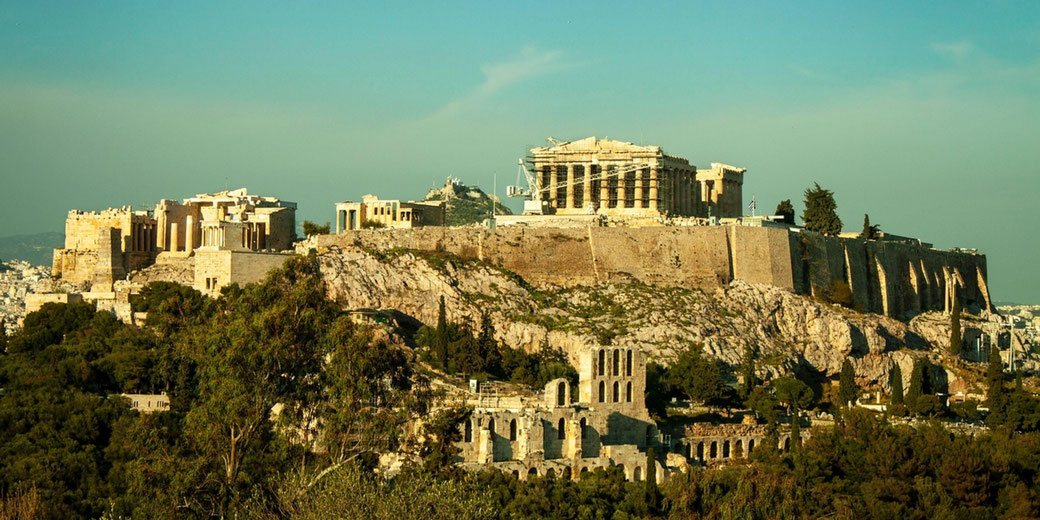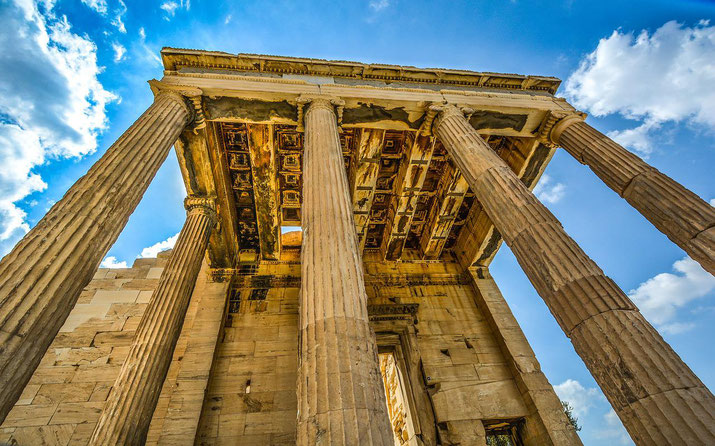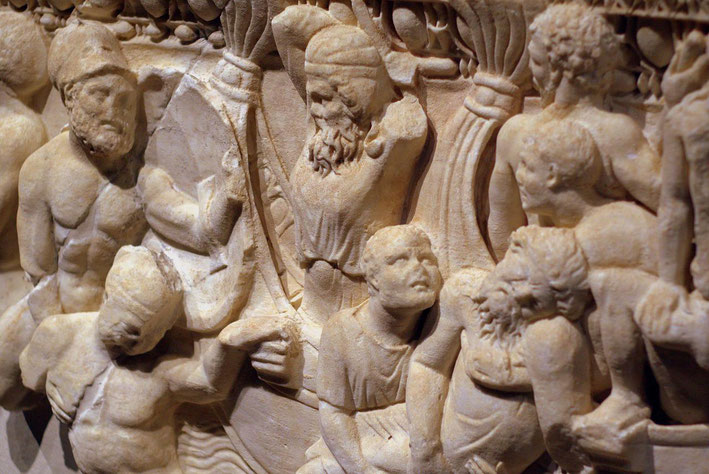The polis: The heart and soul of Ancient Greece

The ancient Greek polis was a type of city-state which was common in the Greek world. In the early days of ancient Greece, communities began to organize themselves into these self-governing entities.
Each polis operated independently, and they became a central feature of Greek political life. As trade and communication improved, these city-states interacted and competed with each other.
The significance of the polis lies in its unique blend of community involvement and external competition, which has even left a lasting influence on modern Western political thought.
What is a 'polis'?
The word 'polis' is Greek for 'city'. Although, in the ancient world, a polis was much more than just a physical settlement.
For more than one polis, the plural word poleis is used. A polis was made up of an urban center, often fortified, and the surrounding countryside.
An important feature of many poleis was an acropolis (which means 'high city'), which was a large hill or small mountain that served as a defensive position for the city.
Often, the acropolis was also home to important religious and political buildings.
For most of Greek history, each individual polis was considered an independent city-state with its own government, laws, currency, and culture.
As a result, individual poleis could differ from each other in terms of size and population.
They also had different levels of importance within the Greek world. For example, Athens was one of the most powerful city-states, while other poleis were less influential.
In many cases, the polis was ruled by a small group of wealthy citizens known as the aristocracy.
The aristocrats usually had a strong military presence and controlled the economy.

When did Greek poleis first appear?
The first poleis appeared in the late Bronze Age in Greece, after 1200 BC.
Historians think that they develop in response to the collapse of the vast Mycenaean palaces, which had previously controlled much of Greece.
Such early poleis were originally small settlements that gradually developed into larger city-states over time.
In reality, the ancient Greek world was made up of hundreds of poleis. Some of the most famous include Athens, Sparta, Corinth, and Thebes.
The number of poleis increased during the Archaic period (750-480 BC), and they began to interact with each other more frequently.
This led to the development of trade and commerce, as well as the formation of alliances and conflicts between different city-states.
Then, the Classical period (480-323 BC) was a time of great prosperity for many poleis, especially Athens.
This was due to the significant growth of trade, art, literature, and philosophy.
It was also a time of greater political turmoil, with the larger city-states vying for power over more regions.
During the Hellenistic period (323-30 BC), the rise of Macedon and the conquest of much of the Greek world by Alexander the Great led to a decline in the importance of the poleis.
Unfortunately, many were absorbed into larger kingdoms, and their autonomy diminished.
How did a polis function?
Essentially, a polis was a community that was bound together by shared customs, values, and beliefs.
The citizens of a polis would work together to defend their city from outside threats and to promote its interests across the rest of the Greek world.
The economy of a polis was usually based on agriculture, trade, and manufacturing. And, most of the time, each polis had its own currency.
This allowed for the development of trade between different city-states. When another polis used another's coins, it was a subtle way of advertising their economic power.
Most cities great their level of wealth through taxes. Usually, the citizens of a polis would pay taxes to support the government and the city's infrastructure.
However, most trade and commerce took place in the agora, or the marketplace.
This was the center of economic activity, where people would buy and sell goods, and it was also a place for political discussion and debate.
What kind of people lived in a polis?
90% of the population of a polis consisted of farmers, artisans, and traders. These people were known as the hoi polloi, or "the many".
The remaining ten percent consisted of the wealthy aristocracy, who controlled the government and the economy. They also held most of the power in society.
What is often forgotten, though, is that there was also a large group of slaves in most Greek cities.
Slaves were usually either born into slavery, captured in war, purchased from slave traders, or taken as a slave to repay debts.
Unfortunately, they had no rights and were owned by wealthy citizens, who were predominantly from the aristocracy.
In some cases, there could be more slaves in a polis than full citizens.
For the citizens, the education of young citizens was important to the polis.
Boys would learn to read and write, and they would be trained in athletics and warfare.
Girls would usually be educated at home by their mothers.
Religious life of Greek cities
Religion played a central role in the life of many of the Greek poleis. The citizens would often worship the city's patron deity and build temples in their honor.
The most important temples were either located in the agora or on the acropolis.
It is important to understand that religion was used to unify the citizens of a polis.
Also, the gods could be called on to help legitimize the authority of a government in times of crisis.
For the common people, they would participate in festivals and religious ceremonies.
These were important occasions for the community to come together and celebrate their shared culture and beliefs.

How did Greek cities defend themselves?
The military was an important part of the functioning of a polis. Male citizens were required to serve in the army, and they would be called upon to defend their city from invasion.
The exact size of a polis' army depended entirely on its wealth and population.
Some of the most powerful city-states could field large armies of semi-professional soldiers.
However, each citizen would be expected to pay for their own weapons and armour.
In addition, they would take time to practice military maneuvers with other citizens so that they knew how to use these items effectively in battle.
A typical Greek soldier was armed with a spear and a shield. Also, he could also wear a range of armor to protect himself in battle, depending on the person's wealth.
Such spear-armed infantry was called 'hoplites' and were the backbone of the Greek army for hundreds of years.
While a polis would focus on the defense of its own lands, they could also sign military alliances with other poleis, if it was in their interests to do so.
Why were Greeks so attached to their cities?
Citizens became very proud of their own polis and would identify strongly with its values and traditions.
This sense of civic pride helped to unify the citizens and make them loyal to their city-state.
It also made the citizens willing to defend their polis from invaders. It would encourage them to fight fiercely to protect their homes and families from harm.
Also, the citizens of a polis would also take great pride in their city's art and architecture.
This meant that they would build beautiful temples and public buildings to show off their wealth and power.
When possible, poleis would even advertise the success of their city at the Olympic Games by paying for the construction of magnificent statues and temples to honour their athletes.
Was there a country called 'ancient Greece'?
There was never a single country called 'ancient Greece'. Instead, the region known as Greece was composed of these independent city-states, which developed their unique identities.
In fact, trade and warfare between these city-states were common, which meant that Greeks often saw each other as enemies, rather than part of the same country.
Because of this, there was no unified national government that ruled over all of ancient Greece.
However, a concept of a common Greek culture between the different cities did slowly develop, which is called 'panhellenism'.
When the city-states were all threatened by a much larger enemy, this sense of unity helped to bind them together.
The idea behind panhellenism was that, regardless of what city you were from, they all the shared Greek language, Greek gods, and valued the same culture.
As strange as it is to us today, it was also based on the belief that all Greeks were descended from the same ancestors, such as Heracles and Dionysius.
This sense of unity helped the Greeks to repel invasions from foreign armies by cooperating with each other in times of need.

Further reading
What do you need help with?
Download ready-to-use digital learning resources
Copyright © History Skills 2014-2025.
Contact via email
With the exception of links to external sites, some historical sources and extracts from specific publications, all content on this website is copyrighted by History Skills. This content may not be copied, republished or redistributed without written permission from the website creator. Please use the Contact page to obtain relevant permission.





